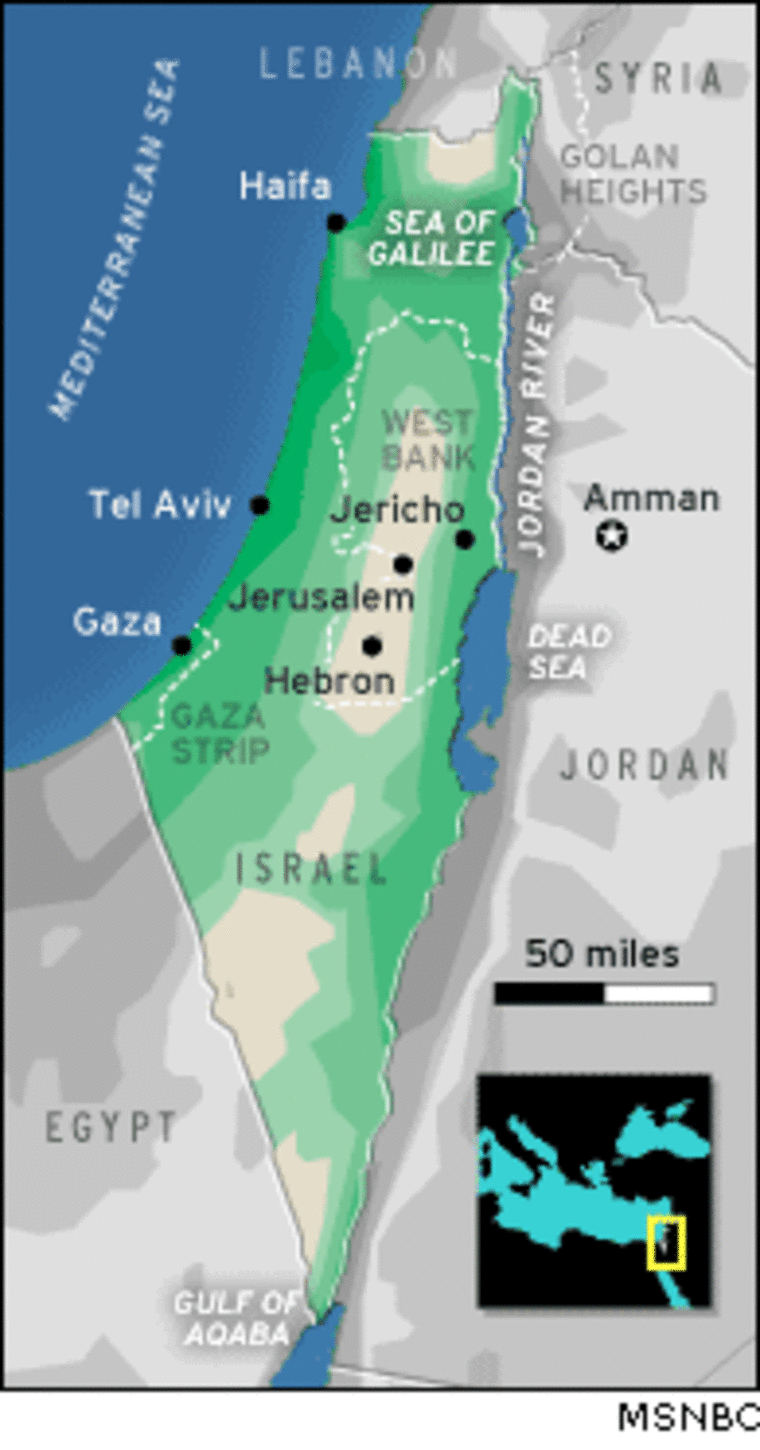Israeli Prime Minister Ariel Sharon told lawmakers Tuesday that moving some Jewish settlements would be part of unilateral measures he is considering toward the Palestinians, according to a lawmaker at the meeting.
Sharon’s hard-line Likud Party has traditionally opposed evacuating Jewish settlements or giving up control of any of the West Bank, which Palestinians claim for a future state. Sharon has hinted recently he might consider such moves, however, saying he expects to detail his plans soon.
Lawmakers said Sharon told members of parliament’s Defense and Foreign Affairs committee he would take unilateral steps before Israel reaches the desperation point in its stalled negotiations with the Palestinians.

“The prime minister said explicitly that we are going to move communities. That’s the prime minister’s exact expression — even before his big plan,” Likud lawmaker Ehud Yatom told Israel Radio.
Sharon, a key architect of Israeli settlement expansion for decades, has shied away from saying he would evacuate West Bank settlements, though he has vaguely spoken of “painful concessions” for peace.
Speaking Monday at an economic conference in Tel Aviv, Sharon said he would propose unilateral actions “if it becomes clear that our Palestinian partners are not willing to destroy terror organizations and are not prepared for real negotiations to reach an arrangement.”
About 220,000 Jews live in 150 settlements in the West Bank and Gaza Strip. Some are near main West Bank population centers, while others are close to Jerusalem and Tel Aviv, just across the West Bank line.
The Palestinians regard the settlements as an illegal encroachment on land they want for a future state and demand that all of them be dismantled.
Sharon also told the committee Tuesday he remained committed to the U.S.-backed “road map” peace plan, but said there were difficulties implementing it.
“I myself am at this time putting together a series of ideas, perhaps a new program, the same program perhaps that everyone is talking about,” Israel Radio quoted Sharon as saying.
HAGUE TO HEAR BARRIER ISSUE
In addition to the settlements, Palestinians are also angry at Israel’s construction of a massive security barrier that dips deep into the West Bank. Israel says it needs the barrier to prevent militants from entering Israel: Palestinians say the planned route, which could leave almost half the territory on the “Israeli” side, transforms the project into a huge land grab.
On Monday, the U.N. General Assembly passed a resolution turning the barrier issue over to the International Court of Justice in The Hague, Netherlands, for an advisory opinion over its legality.
Sharon and Israeli Foreign Minister Silvan Shalom met Monday before the U.N. decision and agreed to cooperate with the Hague court if the case went forward, according to Sharon adviser Raanan Gissin. Israel would tell the court the barrier was needed for self-defense, he said.
“We’ll discuss it and present our case in the court,” Gissin said. “It will be a discussion of the right of Israel to exist, because the fence is meant to protect our existence.”
However, there was no indication Israel would abide by any ruling of the court, which experts said would in any case be non-binding.
Justice Minister Yosef Lapid called Monday for the Cabinet to revisit the route of the barrier.
“The route that was approved is too long, too expensive, not acceptable to the United States and puts the whole world against us,” said Lapid, whose Shinui Party is the second largest in Sharon’s coalition government.
The northern 90-mile section of the barrier, which has been completed, runs mainly along the unmarked line between Israel and the West Bank. Most of the recently approved 228-mile southern section lies within the West Bank.
That new section would trap 274,000 Palestinians in tiny enclaves and block 400,000 others from their fields, jobs, schools and hospitals, according to a recent U.N. report.
Palestinians welcomed Monday’s U.N. decision.
“I think it’s a very clear message to Israel that ... this kind of attempt to impose unilaterally the borders on the ground or to put the Palestinians in cages doesn’t work,” Palestinian Prime Minister Ahmed Qureia said Tuesday. “This is not acceptable.”
Sharon adviser Dore Gold condemned the U.N. resolution as “an exercise in total hypocrisy.”
Dovish lawmakers called on Sharon during the parliamentary meeting Tuesday to reroute the fence along the invisible barrier between Israel and the West Bank.
Meanwhile, Israel’s foreign ministry said Shalom planned to meet Egyptian President Hosni Mubarak in Geneva Wednesday. Israel Radio said Shalom planned to ask Mubarak to help push the peace process forward.